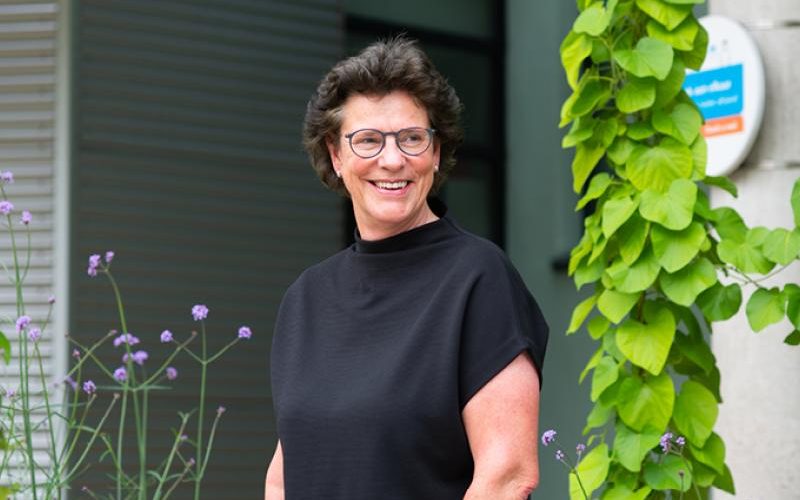Marjolein de Bruin-Weller has as of December 15, 2021 been appointed Professor of Atopic Dermatitis at Utrecht University/UMC Utrecht. The chair will be positioned within the Department of Dermatology & Allergology, one of seven clinical departments of the Division of Internal Medicine and Dermatology. It aims to further develop the multidisciplinary patient care as well as clinical and translational research in atopic dermatitis.
The chair in atopic dermatitis, a very common chronic inflammatory skin disease, will bring the necessary link from applied clinical medicine to basic immunological research and vice versa to further improve outcomes by optimal patient profiling and discovering new targets for intervention. The chair will be positioned within the Department of Dermatology & Allergology, one of seven clinical departments of the Division of Internal Medicine and Dermatology. In this position, Marjolein de Bruin-Weller MD, PhD (Groningen, 1961) will further strengthen the international competitive position of UMC Utrecht in clinical and translational research in atopic dermatitis. One of the main achievables will be involvement in frontline clinical trials and to guide the optimal positioning of new immune-modulating drugs in order to improve clinical outcomes and limit societal costs of the disease. Furthermore, Marjolein will strengthen the necessary link between applied clinical medicine and basic immunological research of the Center for Translational Immunology at UMC Utrecht.
Marjolein de Bruin-Weller studied medicine at Leiden University (1983-1990) and holds a PhD from the University of Groningen (1990). The title of her PhD thesis was “Dynamics of the allergic reaction in the airways and the skin”. After research fellow positions at Astmacenter Heideheuvel (Hilversum) and the Department of Pulmonology, AMC (Amsterdam), Marjolein de Bruin-Weller joined UMC Utrecht in 1997 as a resident at the Department of Dermatology. Currently, she is a staff member at this department and leads the national Expertise Center of Atopic Dermatitis and the research group on atopic dermatitis (together with Prof. Femke van Wijk, Center of Translational Immunology). During the last decade, she has been (co)-PI of 19 clinical and translational studies, mostly on the use of biologicals in treatment of atopic dermatitis. She has published over 150 scientific papers in international scientific journals in the field of atopic dermatitis. She served as co-promotor for several PhD thesis focused on atopic dermatitis and recently as promotor for the cum laude PhD thesis defense by Daphne Bakker.
Marjolein de Bruin-Weller has served as the chair of the Dutch guideline on atopic dermatitis from 2016 onwards. She has a close collaboration with the Dutch atopic dermatitis patient society (VMCE), has been chair of its medical advisory board for many years and collaborates with VMCE on atopic dermatitis research projects, including BioDay. Finally, she is a member of several advisory committees on expensive/add-on medication, including the chronic immune diseases working group at Horizonscan (Zorginstituut Nederland), the committee for expensive medication of the Dutch Society for Dermatology and Venereology (NVDV) and the drug committee of the Dutch Federation of Medical Specialists (FMS).
Marjolein founded the BioDay Registry in 2018. BioDay is a register for recording data on the use of new systemic drugs in atopic dermatitis and atopic comorbidities. In the BioDay Registry, patients with atopic dermatitis are followed and outcomes on effectiveness, safety and patient satisfaction of new medicines in daily practice are investigated. Fourteen centers from different parts of the Netherlands participate in the BioDay registry and over 1000 patients have already been included.
Atopic dermatitis is the most common chronic inflammatory skin disease, with approximately 400,000 patients in the Netherlands alone and healthcare costs exceeding € 150 million per year. Due to new, targeted treatments that are being developed, treatment of Atopic dermatitis is moving towards an era of more personalized medicine. The big challenges with these new treatment modalities are to predict the most optimal treatment for the individual patient, and to monitor and prevent side effects. Marjolein de Bruin-Weller has been instrumental in the fact that the Dutch Federation of University Medical Centers (NFU) has designated the Department of Dermatology & Allergology at UMC Utrecht as a National Center of Expertise for patients with difficult-to-treat atopic dermatitis. Under Marjolein’s leadership, the center is heavily involved in clinical and translational research on atopic dermatitis and patients from all over the Netherlands are referred to this center because of its specific expertise.
